Picture the scene
BBC television centre, 1971, comedy group ‘Monty Python’ have, for reasons unknown, been tasked with naming Ulster’s second largest city. John Cleese wants to call it ‘Derek’, but is dismissed by the others as a “lumbering buffoon”. Chapman, Idle and Jones want to name the city ‘Derry’, but Gilliam and Palin think the name should be ‘Londonderry’. The Pythons are bitterly divided. Michael Palin has been holding Eric Idle in a sleeper hold for almost an hour. Terry Jones has adopted the role of a sniper, viciously firing a homemade slingshot at Palin, Gilliam and the supposedly neutral Cleese, from behind the cover of an overturned desk. The BBC tealady, a Mrs. Edith Runnymede of Peckham, has refused to enter the room, likening the scene to the Battle of Salamis in 480 BCE.
After many hours of comedic warfare, and with the belligerents exhausted, a compromise is agreed. Dismissing Cleese’s suggestion as “the deranged utterance of a gigantic, moustache wearing fruit-bat”, the group decide, in typical surrealist fashion, to simply give the city both names. From then on, the second largest city in Northern Ireland would be known by the unlikely moniker of ‘Derry/Londonderry’.
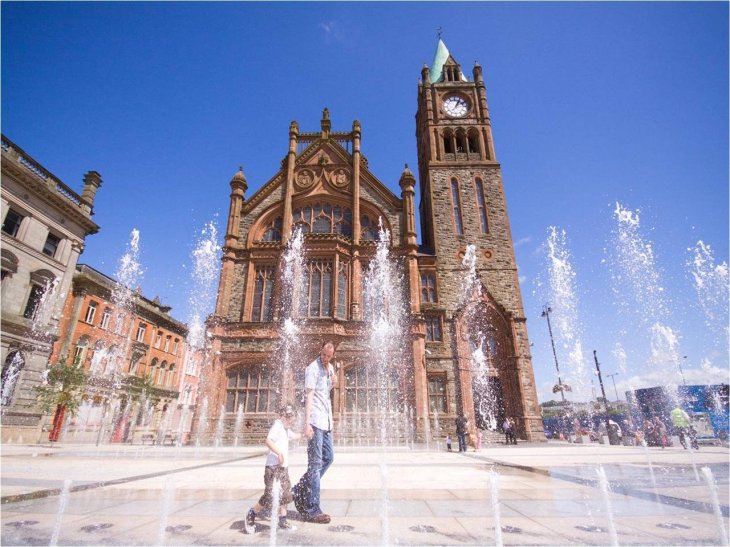
Londonderry. Northern Europe’s forgotten jewel
Fast forward to 2018
Ulster’s barbarian tribes have been warring since time immemorial. They fought over which flag to fly. They fought over which language everyone should be forced to speak, and they fought over what exactly their second city should be called. The Green tribe, known for their love of strong drink and their propensity for blowing up small children, insisted that it be called ‘Derry’. The Orange tribe, known for their love of synchronised walking and their propensity for shooting people in the face, insisted that the correct name was ‘Londonderry’. For decades, both tribes stuck to their respective choice, then unbelievably, the freshly installed High Chief of the Green tribe, the fabled warrior queen, Mary Lou, uttered the ‘L’ word, calling the second city ‘Londonderry’!
The Green tribe was sharply divided. Some, perhaps mellowed by years of alcohol abuse and sad folk ballads, argued that it was ok to call the place Londonderry sometimes. Others though, incensed by the addition of two extra syllables, argued that Mary Lou had committed an inexcusable act of treason and could no longer be High Chief of the Green tribe. Meanwhile, most of the Orange tribe merely smirked and went back to beating their very large drums with very thin sticks, whilst the civilised tribes to the south and across the narrow sea to the east, scratched their heads and wondered just how they had ended up being the neighbours of such clearly insane people.
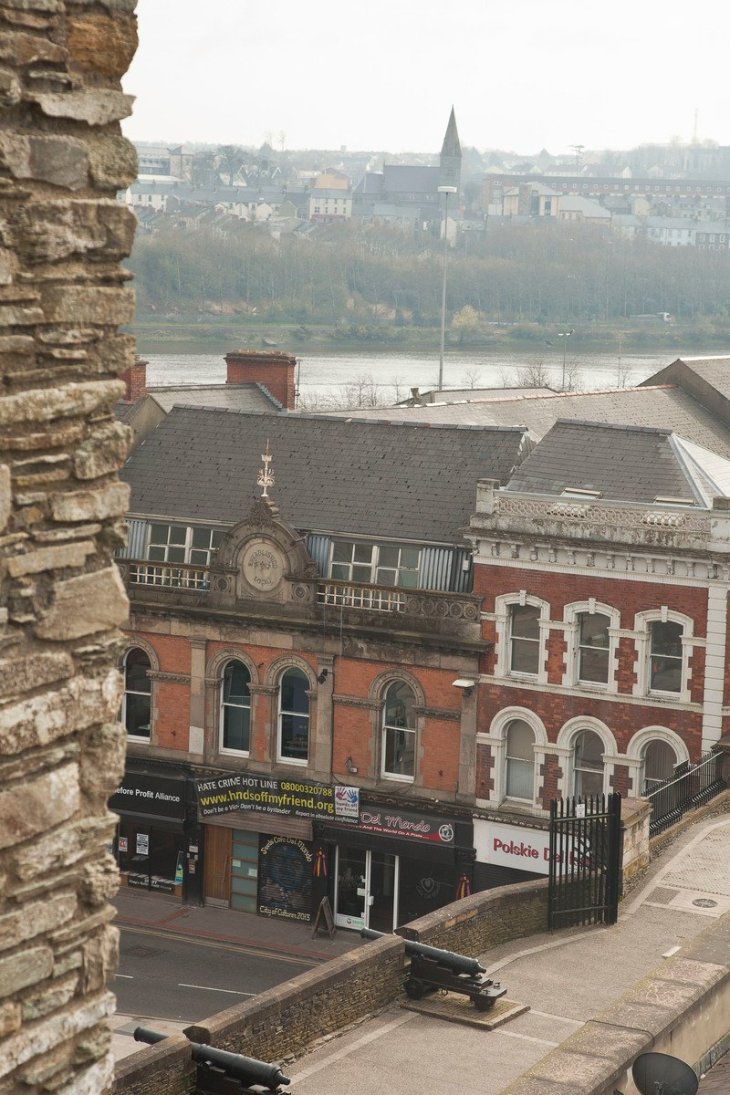
A section of Derry’s walls
Seriously though
The furore that erupted recently over Sinn Féin President Mary Lou McDonald’s use of the term ‘Londonderry’, was tragically comic. I was born and raised in County Londonderry. I use the terms Derry and Londonderry interchangeably. The Orange anthem ‘the Sash my Father Wore’ calls it Derry. The Apprentice Boys of Derry call it Derry (shocker!). In all honesty it is simply not that big an issue for most Loyalists and Unionists. An official name change is a different matter, although personally I would not be that bothered. It would seem though that for Irish nationalists and republicans this is a much more touchy subject.

Derry is both historic and modern
The reaction of some Irish republicans has been hilarious. To see the usually well rehearsed and polished republican propaganda machine scrambling to try and bury this “controversy” has been highly amusing. These are the same people who made much of the fact that (some) Unionists and Loyalists placed such importance on flags and emblems. Is the word ‘Derry’ not a verbal emblem? I hope, although I don’t expect for one moment, that the numerous ‘satirical’ groups (lol) on social media have lampooned hardline republicans over this issue in the same way that they used the flags issue to try to belittle and mock the fringe elements of Loyalism and Unionism. Of course, that would be too much to ask. After all, one cannot be the drinking buddy of certain north Belfast republican dissidents, and then use one’s multiple social media accounts to lambast and laugh at republicans. Better to just trot out the same old bile you’ve been vomiting out since 2012 (there might still be a few £ in it yet ;).
And finally…
You see, this is why I was reluctant to start blogging about N.I. politics again. Whilst I’ve had a chuckle at the pettiness and insecurities of Irish republicans, the whole episode has also been slightly depressing. Twenty years after the signing of the Belfast Agreement and Ulster remains as divided, and as ridiculous as ever.

Between 1969 & 1999, more than 30,000 Ulster-Scots were “ethnically cleansed” from Derry’s west-bank
If you are one of the many foreign readers of this blog, please don’t let the infantile squabbles of extreme Irish nationalists put you off visiting our beautiful little nation, and visiting Londonderry in particular. Derry is a wonderful, charming, vibrant city. The most well preserved walled city in western Europe. It is historic, picturesque (mostly), welcoming and inexpensive to visit. In fact, whatever you like to call it, it’s the greatest little city in the whole British Isles!
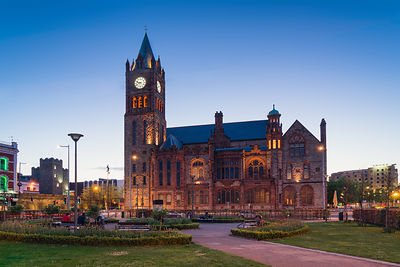
Beautiful and historic Londonderry

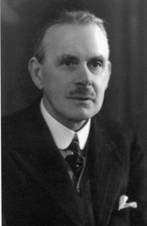

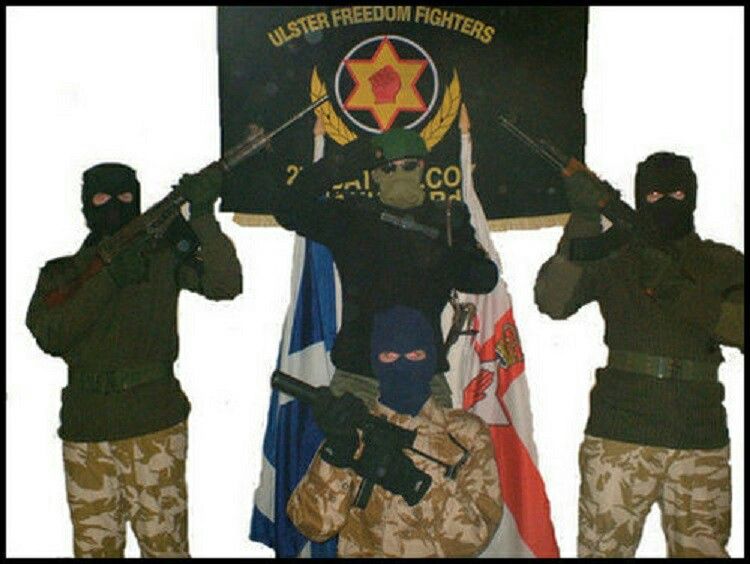
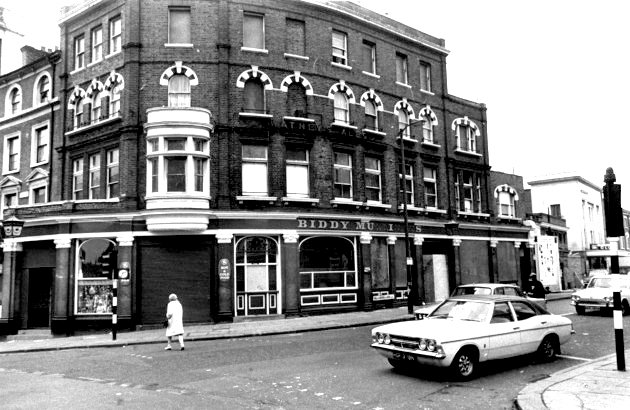



You must be logged in to post a comment.